2020-2021年一般将来时知识点总结和题型总结1
- 格式:doc
- 大小:110.00 KB
- 文档页数:16

一般将来时1.一般将来时:表示将来要发生的动作或存在的状态。
2.一般将来时的助动词:will, shall(只用于主语是第一人称时), am going to, is going to, are going to3.一般将来时的谓语结构:will+V,shall+V,am going to+V,is going to+V,are going to+V (V表示动词原形)4.一般将来时的主语与谓语结构:肯定句一般疑问句否定句1) 主语+will+V Will+主语+V 主语+won’t+V (will not=won’t)2) I/We+shall+V Shall+I/We+V I/We+shan’t+V (shall not=shan’t)3) I+am going to+V Am+I+going to+V I+am not going to+V4) 主语(第三人称单数)+is going to+V Is+主语(第三人称单数)+going to+V 主语(第三人称单数)+isn’t going to +V5) 主语(复数人称)+are going to+V Are+主语(复数人称)+going to+V 主语(复数人称)+aren’t going to+V5.There be句型的一般将来时结构:肯定句一般疑问句否定句1) There will be…Will there be…There won’t be…2) There is going to be…Is there going to be…There isn’t going to be…3) There are going to be…Are there going to be…There aren’t going to be…6.句子中有下列结构时,句子用一般将来时:1) 句子中有tomorrow或tomorrow构成的时间短语:tomorrow, tomorrow morning, tomorrow afternoon, tomorrow evening, the day after tomorrow 例:They will have a party the day after tomorrow.=They are going to have a party the day after tomorrow.There is going to be a baseball match tomorrow afternoon.2) 句子中有“next+时间名称”的短语时:next week, next day, next year, next month, next spring, next term, next weekend,next morning…….(注意:句子中如果有“the next+时间名称”的短语,句子通常用一般过去时。

一般将来时(知识梳理+真题+练习)知识梳理1、定义:表示将要发生的动作或存在的状态,以及打算,计划或准备某事,句中一般含有表示将2、构成:①be going to+动词原形如:Iam going to see a Beijing opera tomorrow.We are going to meet at bus stop at half past ten.Dad and I are going to see a Beijing opera this afternoon.②will+动词原形如:They will go swimming this afternoon.3:be going to和will区别:①be going to表示经过事先安排,打算和决定要做的事情,基本上一定会发生;will则表示有可能去做,但不一定发生,也常表示说话人的临时决定。
②be going to表示近期或眼下就要发生的事情;will表示将来的时间则较远一些。
如:He is going to write a letter tomorrow.I will meet her one day.③be going to还可以用来表示有迹象表明某件事情将要发生,常用于天气等自然现象。
如:Look!It's going to rain.4、一般将来时句型转换:名校真题体验1.Li Yuan_____12 years old tomorrow.(长春市某中学招生入学考试真题)A. is going toB. will beC. isD. was解析:由tomorrow (明天)可知词句时态为一般将来时时,故选B2.Jack _________back home tomorrow.A. is going to beB. beC. was解析:由tomorrow (明天)可知词句时态为一般将来时时,故选A。
(济南市某重点中学入学试题)习题练习1.My aunt ________(come)back tomorrow . We are very excited .2.She will ________(visit) her uncle next week.3.What are you going________(do) there?4.They ________(plant) trees tomorrow.5.—________ Timmy ________(visit) his friends next Sunday? —Yes, he is.6.Tom ________ (go) to plant trees next day. He ________ (go) to plant trees every year.7.He________(visit) the farm next week.语法及练习6 将来时将来时一、概念:表示将要发生的动作或存在的状态及打算、计划或准备做某事。
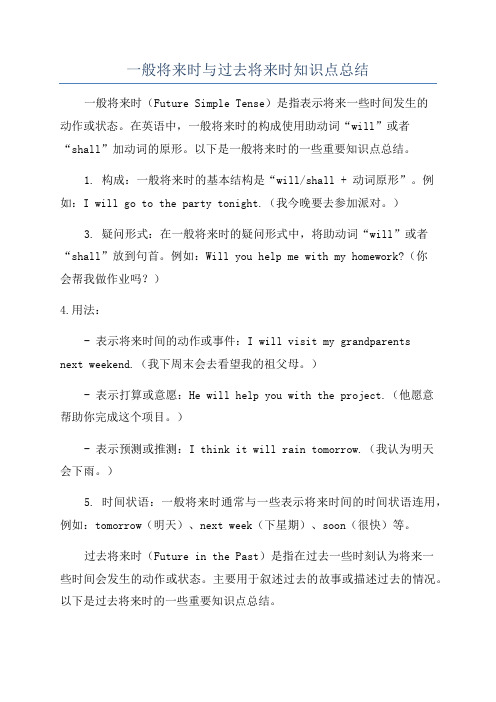
一般将来时与过去将来时知识点总结一般将来时(Future Simple Tense)是指表示将来一些时间发生的动作或状态。
在英语中,一般将来时的构成使用助动词“will”或者“shall”加动词的原形。
以下是一般将来时的一些重要知识点总结。
1. 构成:一般将来时的基本结构是“will/shall + 动词原形”。
例如:I will go to the party tonight.(我今晚要去参加派对。
)3. 疑问形式:在一般将来时的疑问形式中,将助动词“will”或者“shall”放到句首。
例如:Will you help me with my homework?(你会帮我做作业吗?)4.用法:- 表示将来时间的动作或事件:I will visit my grandparentsnext weekend.(我下周末会去看望我的祖父母。
)- 表示打算或意愿:He will help you with the project.(他愿意帮助你完成这个项目。
)- 表示预测或推测:I think it will rain tomorrow.(我认为明天会下雨。
)5. 时间状语:一般将来时通常与一些表示将来时间的时间状语连用,例如:tomorrow(明天)、next week(下星期)、soon(很快)等。
过去将来时(Future in the Past)是指在过去一些时刻认为将来一些时间会发生的动作或状态。
主要用于叙述过去的故事或描述过去的情况。
以下是过去将来时的一些重要知识点总结。
2. 否定形式:在过去将来时的否定形式中,将助动词“would”或者“should”和动词原形之间加上“not”。
例如:She said she wouldnot be able to attend the meeting.(她说她不能去参加会议。
)3. 疑问形式:在过去将来时的疑问形式中,将助动词“would”或者“should”放到句首。
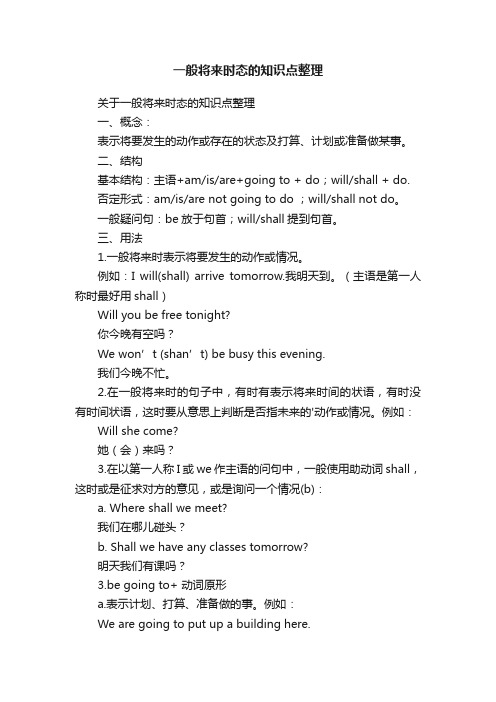
一般将来时态的知识点整理关于一般将来时态的知识点整理一、概念:表示将要发生的动作或存在的状态及打算、计划或准备做某事。
二、结构基本结构:主语+am/is/are+going to + do;will/shall + do.否定形式:am/is/are not going to do ;will/shall not do。
一般疑问句:be放于句首;will/shall提到句首。
三、用法1.一般将来时表示将要发生的动作或情况。
例如:I will(shall) arrive tomorrow.我明天到。
(主语是第一人称时最好用shall)Will you be free tonight?你今晚有空吗?We won’t (shan’t) be busy this evening.我们今晚不忙。
2.在一般将来时的句子中,有时有表示将来时间的状语,有时没有时间状语,这时要从意思上判断是否指未来的'动作或情况。
例如:Will she come?她(会)来吗?3.在以第一人称I或we作主语的问句中,一般使用助动词shall,这时或是征求对方的意见,或是询问一个情况(b):a. Where shall we meet?我们在哪儿碰头?b. Shall we have any classes tomorrow?明天我们有课吗?3.be going to+ 动词原形a.表示计划、打算、准备做的事。
例如:We are going to put up a building here.我们打算在这里盖一座楼。
How are you going to spend your holidays?假期你准备怎样过?b.表示即将发生或肯定要发生的事。
例如:I think it is going to snow.我看要下雪了。
练习题:1.I ____ just ____ (finish) my homework.2.He ____ (go) to school on foot every day.3. ____ you ____ (find) your science book yet?4.If it ____ (be) fine tomorrow, I’ll go with you.5.She doesn’t like the children ____ (play) in the room.6.The students ____ (read) English when the teacher came in.7.Look! The monkey ____ (climb) the tree.8.My mother ____ (come) to see me next Sunday.9.How many sheep ____ you ____ (get)? Only one.10.I’ve lost my pen. ____ you ____ (see) it anywhere?。

专题10 一般将来时一、一般将来时的概念一般将来时表示将来某个时间要发生的动作或存在的状态。
如:I am going to play football tomorrow.我明天打算去踢足球。
Amy will be 12 years old next year. 艾米明年计12岁了。
There will be a football match in our school next week. 我们学校下周将举行一场足球比赛。
二、一般将来时的动词结构①主语+be going to + 动词原形+其它。
②主语+will + 动词原形+其它。
三、一般将来时的句式结构1. 含有be going to的句型(1) 肯定句:主语+ be going to +动词原形+其他。
如:I'm going to have a picnic this afternoon. 今天下午我将要去野餐。
(2) 否定句:主语+be+ not going to +动词原形+其他。
如:I'm not going to have a picnic this afternoon. 今天下午我将不去野餐。
(3) 一般疑问句:Be +主语+ going to +动词原形+其他?肯定回答:Yes, 主语+be.否定回答:No, 主语+ be + not. 如:例:I am going to have a picnic this afternoon. 我今天下午要去野餐。
(改为一般疑问句并作回答) —Are you going to have a picnic this afternoon? 你今天下午将要去野餐吗?—Yes, I am. 是的,我要去。
—No, I’m not. 不,我不去。
(4) 特殊疑问句:特殊疑问词+一般疑问句?What are you going to do tomorrow? 你明天将要去做什么?例:Sam is going to have a birthday party this Friday. 山姆这周五将有一个生日派对。
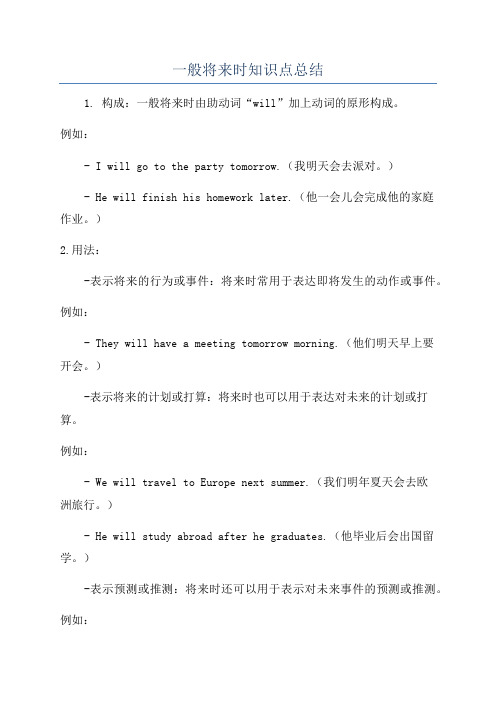
一般将来时知识点总结1. 构成:一般将来时由助动词“will”加上动词的原形构成。
例如:- I will go to the party tomorrow.(我明天会去派对。
)- He will finish his homework later.(他一会儿会完成他的家庭作业。
)2.用法:-表示将来的行为或事件:将来时常用于表达即将发生的动作或事件。
例如:- They will have a meeting tomorrow morning.(他们明天早上要开会。
)-表示将来的计划或打算:将来时也可以用于表达对未来的计划或打算。
例如:- We will travel to Europe next summer.(我们明年夏天会去欧洲旅行。
)- He will study abroad after he graduates.(他毕业后会出国留学。
)-表示预测或推测:将来时还可以用于表示对未来事件的预测或推测。
例如:- It will rain tomorrow.(明天会下雨。
)3.特殊用法:- be going to:此结构用于表示对未来的计划或打算,意义与一般将来时相近。
例如:- They are going to get married next month.(他们下个月打算结婚。
)- She is going to start a new job next week.(她下周将开始新的工作。
)- be about to:此结构用于表示即将发生的行为或事件,常含有紧迫感。
例如:- The show is about to begin.(演出即将开始。
)- I am about to leave for the airport.(我即将出发去机场。
)4.时间和条件状语:-时间状语:一般将来时常常与时间状语连用,表示动作发生的时间。
例如:tomorrow(明天)、next week(下周)、in the future(将来)-条件状语:一般将来时也可以与条件状语连用,表示其中一种条件下的将来动作。
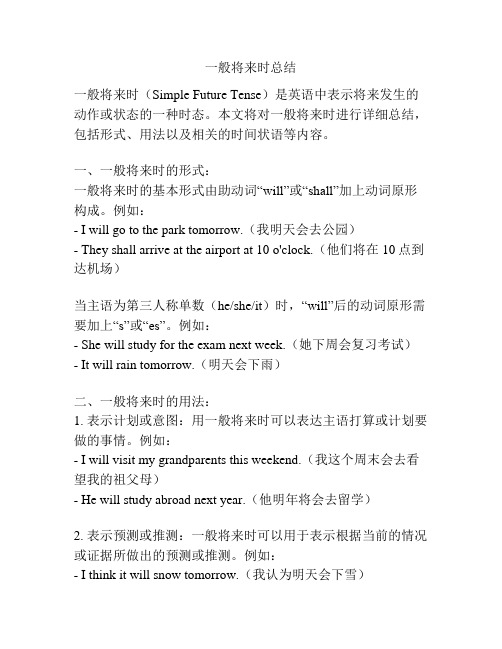
一般将来时总结一般将来时(Simple Future Tense)是英语中表示将来发生的动作或状态的一种时态。
本文将对一般将来时进行详细总结,包括形式、用法以及相关的时间状语等内容。
一、一般将来时的形式:一般将来时的基本形式由助动词“will”或“shall”加上动词原形构成。
例如:- I will go to the park tomorrow.(我明天会去公园)- They shall arrive at the airport at 10 o'clock.(他们将在10点到达机场)当主语为第三人称单数(he/she/it)时,“will”后的动词原形需要加上“s”或“es”。
例如:- She will study for the exam next week.(她下周会复习考试)- It will rain tomorrow.(明天会下雨)二、一般将来时的用法:1. 表示计划或意图:用一般将来时可以表达主语打算或计划要做的事情。
例如:- I will visit my grandparents this weekend.(我这个周末会去看望我的祖父母)- He will study abroad next year.(他明年将会去留学)2. 表示预测或推测:一般将来时可以用于表示根据当前的情况或证据所做出的预测或推测。
例如:- I think it will snow tomorrow.(我认为明天会下雪)- They believe she will win the competition.(他们相信她会赢得比赛)3. 表示意愿或允诺:一般将来时可以表达主语的意愿或承诺要做某事。
例如:- I will help you with your homework.(我会帮你做作业)- He will stop smoking.(他将戒烟)4. 表示预定的事件或安排的计划:一般将来时可以用于表示已经安排好的事件或计划。
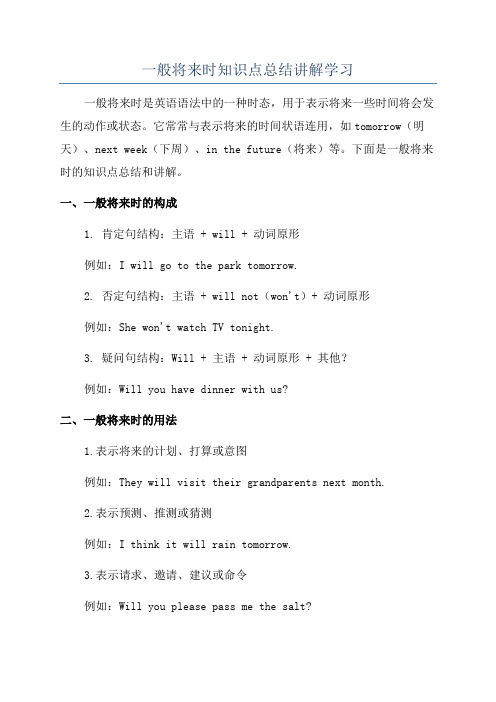
一般将来时知识点总结讲解学习一般将来时是英语语法中的一种时态,用于表示将来一些时间将会发生的动作或状态。
它常常与表示将来的时间状语连用,如tomorrow(明天)、next week(下周)、in the future(将来)等。
下面是一般将来时的知识点总结和讲解。
一、一般将来时的构成1. 肯定句结构:主语 + will + 动词原形例如:I will go to the park tomorrow.2. 否定句结构:主语 + will not(won't)+ 动词原形例如:She won't watch TV tonight.3. 疑问句结构:Will + 主语 + 动词原形 + 其他?例如:Will you have dinner with us?二、一般将来时的用法1.表示将来的计划、打算或意图例如:They will visit their grandparents next month.2.表示预测、推测或猜测例如:I think it will rain tomorrow.3.表示请求、邀请、建议或命令例如:Will you please pass me the salt?4.表示承诺、威胁或警告例如:I will help you with the project.5.在主句中的时间状语从句中,一般将来时常常用于表示将来的动作或状态。
例如:I will go shopping when I finish my work.三、一般将来时的注意事项1.一般将来时表示先于现在或过去的将来动作或状态,与现在的决定或打算无关。
例如:I will study abroad next year. (现在决定)2. be动词的一般将来时构成为will be,否定形式为will not be (won't be)。
例如:He will be at home tomorrow.3.一般将来时常常与表示将来的时间状语连用。

一般将来时知识点总结一般将来时(Simple Future Tense)是英语中用来表示将来时态的一种时态。
它通常用来描述计划、预测以及意愿等将来发生的动作或状态。
以下是一般将来时的主要知识点总结:1. 标志词:一般将来时的标志词包括:will, shall和be going to 等。
其中,will和shall是最常用的标志词,而be going to则更加注重于已经做好的准备和计划。
2. 表示将来的动词形式:一般将来时的动词形式为动词原形。
例如:- I will go to the park tomorrow.- They shall arrive at 7 o'clock in the evening.- She is going to study abroad next year.3. 表示将来的疑问句与否定句:- 疑问句:将助动词will或shall放在主语之前即可。
例如:- Shall we start the meeting now?- 否定句:在will或shall后面加上not即可。
例如:- I will not forget your birthday.- They shall not pass the exam.4. 表示将来的时间状语:- 一般将来时通常与一些表示将来的时间状语连用,例如:tomorrow, next week, in the future等。
例如:- She will visit her parents tomorrow.- I am going to travel abroad next month.总结:一般将来时是用来表达将来发生的动作或状态的时态。
通过掌握标志词、动词形式、疑问句与否定句以及时间状语等知识点,我们可以更加准确地使用一般将来时来表达自己的意思。
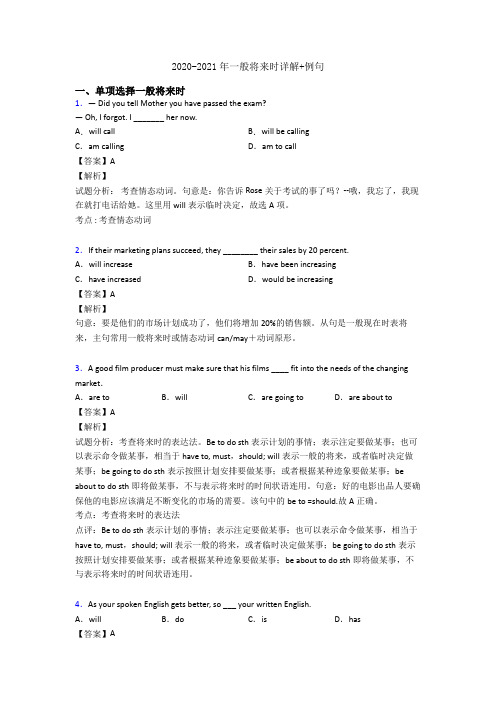
2020-2021年一般将来时详解+例句一、单项选择一般将来时1.— Did you tell Mother you have passed the exam?— Oh, I forgot. I _______ her now.A.will call B.will be callingC.am calling D.am to call【答案】A【解析】试题分析:考查情态动词。
句意是:你告诉Rose关于考试的事了吗?--哦,我忘了,我现在就打电话给她。
这里用will表示临时决定,故选A项。
考点 : 考查情态动词2.If their marketing plans succeed, they ________ their sales by 20 percent.A.will increase B.have been increasingC.have increased D.would be increasing【答案】A【解析】句意:要是他们的市场计划成功了,他们将增加20%的销售额。
从句是一般现在时表将来,主句常用一般将来时或情态动词can/may+动词原形。
3.A good film producer must make sure that his films ____ fit into the needs of the changing market.A.are to B.will C.are going to D.are about to【答案】A【解析】试题分析:考查将来时的表达法。
Be to do sth表示计划的事情;表示注定要做某事;也可以表示命令做某事,相当于have to, must,should; will表示一般的将来,或者临时决定做某事;be going to do sth表示按照计划安排要做某事;或者根据某种迹象要做某事;be about to do sth即将做某事,不与表示将来时的时间状语连用。

一般将来时与过去将来时知识点总结一、一般将来时1.肯定句的结构为:主语 + will + 动词原形 + 其他成分例如:- I will go to the park tomorrow.(我明天将去公园。
)- They will have a meeting next week.(他们下周将开会。
)2.否定句的结构为:主语 + will not(won’t)+ 动词原形 + 其他成分例如:- We won’t be late for the concert.(我们不会迟到演唱会。
)3.疑问句的结构为:Will + 主语 + 动词原形 + 其他成分?例如:- Will you help me with my homework?(你会帮我做作业吗?)4.一般将来时还可以用于表示打算、意向、承诺、警告等。
例如:- We will visit our grandparents this weekend.(我们本周末会去看望祖父母。
)- He will work hard to pass the exam.(他会努力学习以通过考试。
)- I won’t accept the j ob offer.(我不会接受这个工作机会。
)5.当表示将来的时间或条件时,可以使用其他时间状语或条件从句来修饰。
例如:二、过去将来时过去将来时用于表示过去一些时间将要发生的动作或状态,一般由助动词"would"或"should"加上动词的原形构成。
1.肯定句的结构为:主语 + would / should + 动词原形 + 其他成分例如:- She said she would meet me at the airport yesterday.(她说她昨天会在机场接我。
)- They knew they should finish their homework before going out.(他们知道他们应该在出去之前完成作业。

2020-2021年一般将来时综合分类解析经典1一、一般将来时1.If our government attention to controlling food safety now, our health ________ in danger.A. won't pay; isB. doesn't pay; isC. won't pay; will beD. doesn't pay; will be【答案】 D【解析】【分析】句意:如果我们的政府现在不注意控制食品安全,我们的健康就会出于危险之中。
结合语境可知本句主语描述的是将来某时进行的动作,故用一般将来时态。
当主句描述将来时态,条件状语从句中用一般现在时态表示将来动作,结合语境可知选D。
【点评】英语中的时态主要是借助于时间状语与上下文语境来进行判断。
解答此类题型,首先要注意句子中的时间状语,如果没有则要通过分析上下文,结合语境来判断句子的时态。
英语疑问句中一般具有时态上的对应关系,注意结合这一特点进行区分。
英语状语从句的时态与主句有比较紧密的联系,若主句为一般将来时,时间和条件状语从句通常要用一般现在时表示将来,而不能直接使用将来时态。
2.— Let's go fishing if it this weekend.— But nobody knows if it .A. is fine; will rainB. will be rain; rainsC. will be fine; will rainD. is fine; rains 【答案】 A【解析】【分析】句意:——如果这个周末晴天我们去钓鱼吧。
——但是没人知道是否会下雨。
第一个空前的if引导条件状语从句,意思是“如果”,从句中用一般现在时表示将来;第二个空前的if引导宾语从句,意思是“是否”,根据从句的tomorrow可知用一般将来时;故选A。

2020-2021年一般将来时的归纳一、单项选择一般将来时1.The class teacher was anxious to hear one of his top students _____ because of family move.A.will leave B.is leavingC.was leaving D.has left【答案】C【解析】be doing可以用来表示将来,指按照时间安排表即将发生的事情,是有计划安排的;will do 强调的是主观性,不表达按时间安排表即将发生的事情。
句意:得知班里一个尖子生因为家庭原因要离开学校,班主任很焦虑。
2.A good film producer must make sure that his films ____ fit into the needs of the changing market.A.are to B.will C.are going to D.are about to【答案】A【解析】试题分析:考查将来时的表达法。
Be to do sth表示计划的事情;表示注定要做某事;也可以表示命令做某事,相当于have to, must,should; will表示一般的将来,或者临时决定做某事;be going to do sth表示按照计划安排要做某事;或者根据某种迹象要做某事;be about to do sth即将做某事,不与表示将来时的时间状语连用。
句意:好的电影出品人要确保他的电影应该满足不断变化的市场的需要。
该句中的be to =should.故A正确。
考点:考查将来时的表达法点评:Be to do sth表示计划的事情;表示注定要做某事;也可以表示命令做某事,相当于have to, must,should; will表示一般的将来,或者临时决定做某事;be going to do sth表示按照计划安排要做某事;或者根据某种迹象要做某事;be about to do sth即将做某事,不与表示将来时的时间状语连用。

2020-2021年过去将来时一般过去时知识点总结和题型总结经典一、过去将来时1.When we lived in Hangzhou ten years ago, we for a walk after dinner.A. goB. would goC. wentD. goes【答案】B【解析】【分析】句意:当十年前我们还住在杭州的时候,我们吃完晚饭会出去散步。
When引导时间状语从句,从句用一般过去时,主句用过去将来时,would+动词原形,表示过去习惯性的动作。
故选B。
【点评】考查would+动词原形表习惯性动作。
2.Mr. Wu said he ______ us to the zoo the next week.A. would takeB. will takeC. takeD. takes【答案】 A【解析】【分析】通过分析本句可知,本句是一个宾语从句。
根据next week可知,从句应该将来时,故排除CD;在宾语从句中,主句用过去时,则从句也应该用过去时的某种形式,故用would take。
所以本题选A。
【点评】对于宾语从句应该注意四点:1、语序:用陈述句语序;2、引导词:A.that B.特殊疑问词C.if/whether 3、时态:•当主句是一般现在时,从句的时态根据从句的时间变化‚当主句的时态是过去时时,从句应该用过去的某种时态ƒ当从句表示客观事实或客观真理等时,从句要用一般现在时。
4、人称:根据实际情况变换人称。
而本题只考查了时态。
3.—What did Alice say?—She said she me at eight o'clock tomorrow morning.A. is callingB. was callingC. will callD. would call【答案】 D【解析】【分析】句意:爱丽丝说了什么?——她说她明天上午八点钟给我打电话。
结合语境可知下文从句中描述的是站在过去角度看将来发生的动作,故用过去将来时态。

2020-2021年一般将来时知识点总结(3)一、一般将来时1.Maybe in the near future, students ______________ at home through the Internet.A. studyB. has studiedC. is studyingD. will study【答案】 D【解析】【分析】句意:或许在不久的将来,学生将通过网络在家里学习。
A.学习,一般现在时;B.已经学习,现在完成时;C.正在学习,现在进行时;D.将要学习,一般将来时。
根据in the near future可知时态是一般将来时,结构是will+动词原形,故选D。
【点评】考查一般将来时,注意平时识记其结构及标志词。
2.With the development of science and technology, robot cooks ______ in our families in the future.A. appearB. appearedC. will appearD. were appearing【答案】 C【解析】【分析】句意:随着科学技术的发展,在未来机器人厨师将出现在我们的家庭中. 根据in the future可知,此句表示动作发生在将来,所以用一般将来时态;一般将来时态结构为:will+动词原形,故选C.【点评】判断动词的时态,要通过所给的时间状语、提示词或语境去判断动词存在的状态. 一般将来时态结构为:will+动词原形.3.I’m so lucky because I see more cartoon characters next month.A. is able toB. will be able toC. be able toD. was able to【答案】B【解析】【分析】句意:我真幸运因为我下个月能看到更多的卡通人物。
next month表将来,因此用will be able to。

2020-2021年一般将来时知识点总结(word)(2)一、一般将来时1.Robots _____more heavy work for us in the future.A. will doB. didC. have doneD. were doing【答案】 A【解析】【分析】句意:在未来,机器人将为我们做更多繁重的工作。
根据in the future 可知此处用一般将来时,故选A。
【点评】考查时态的用法。
2.—Have you watched the new movie Kung Fu Panda 3, Kelly?—Not yet. I _____ it with my classmate tonight.A. will watchB. was watchingC. have watched【答案】A【解析】【分析】句意:—凯莉,你看过新电影《功夫熊猫3》吗?—还没有呢。
今天晚上我要和我的同学一起去看。
A. will watch一般将来时态形式;B. was watching过去进行时态形式;C. have watched现在完成时态形式。
本句描述的是今天晚上将要发生的动作,句子用一般将来时态。
故选A。
【点评】本题考查时态辨析。
以及will watch;was watching;have watched三种时态的用法和区别3.— There ________a football match on TV tonight. I can't wait to watch it.— Me, too. It's ________ Guangzhou Evergrande and the Australian team Melbourne Victory.A. will be; betweenB. will be; bothC. will have; betweenD. will have; both【答案】A【解析】【分析】句意为:---今晚将有一场电视直播足球比赛,我非常想看。

2020-2021年一般将来时综合分类解析经典一、一般将来时1.We____ shopping unless it ____ tomorrow.A. will go, will rainB. go, will rainC. will go, rainsD. go, rains【答案】C【解析】【分析】句意:除非明天下雨,否则我们将会去购物。
unless 除非,引导条件状语从句,从句中应该用一般现在时表示将来,主句用一般将来时。
故应选C。
【点评】考查动词时态。
2.— I hear your father has gone to Tokyo on business?— Yes. And he _______ in three weeks.A. has returnedB. will returnC. would returnD. returns【答案】 B【解析】【分析】句意:—我听说你父亲出差去日本了?—是的。
他将在三周后回来。
时间状语in three weeks与一般将来时连用,故选B。
3.I _________ the shops. Can I get you anything?A. go toB. went toC. have gone toD. am going to【答案】 D【解析】【分析】句意:我将去商店,我可以给你买一些东西吗迭项八是一般现在时,表示经常性的行为或状态;选项B是一般过去时,表示动作发生在过去,和现在没有关系;选项C 是现在完成时,表示过去发生的动作对现在造成的影响或结果。
根据Can I get you anything?可知,说话的时候,还没有去商店,所以应该用一般将来时。
故选:D。
4.Susan and her sister ________ some photos in the park the day after tomorrow.A. takeB. tookC. will take【答案】 C【解析】【分析】句意:Susan和她的妹妹后天会在公园照一些照片。

2020-2021年一般将来时分类详解一、单项选择一般将来时1.The purpose of education be to provide students with a value system – not to prepare them for a specific job.A.will B.should C.could D.may【答案】A【解析】B 考查情态动词。
句意:教育的目的是提供给学生一个有价值的体系,而不是为特定的工作进行准备。
Should 表示应该。
2.A good film producer must make sure that his films ____ fit into the needs of the changing market.A.are to B.will C.are going to D.are about to【答案】A【解析】试题分析:考查将来时的表达法。
Be to do sth表示计划的事情;表示注定要做某事;也可以表示命令做某事,相当于have to, must,should; will表示一般的将来,或者临时决定做某事;be going to do sth表示按照计划安排要做某事;或者根据某种迹象要做某事;be about to do sth即将做某事,不与表示将来时的时间状语连用。
句意:好的电影出品人要确保他的电影应该满足不断变化的市场的需要。
该句中的be to =should.故A正确。
考点:考查将来时的表达法点评:Be to do sth表示计划的事情;表示注定要做某事;也可以表示命令做某事,相当于have to, must,should; will表示一般的将来,或者临时决定做某事;be going to do sth表示按照计划安排要做某事;或者根据某种迹象要做某事;be about to do sth即将做某事,不与表示将来时的时间状语连用。

2020-2021年一般将来时知识点总结和题型总结经典1一、一般将来时1.—How many children do most post-80s families have?—One. They ______ two in the future, I guess.A. will haveB. hadC. haveD. have had【答案】A【解析】【分析】句意:——大部分80后的家庭有几个孩子?——一个。
我猜想将来他们会有两个的。
A.will have将会有;B为have的原形;C为have的过去完成时。
根据回答中“in the future”在将来,可知应选将来时。
一般将来时的两种结构:will+动词原形或be going to do,故选A。
【点评】考查时态一般将来时,注意一般将来时的状语提示,如tomorrow,next year ,in the future等。
2.— I hear your father has gone to Tokyo on business?— Yes. And he _______ in three weeks.A. has returnedB. will returnC. would returnD. returns【答案】 B【解析】【分析】句意:—我听说你父亲出差去日本了?—是的。
他将在三周后回来。
时间状语in three weeks与一般将来时连用,故选B。
3.—Do you know when Mrs. White for dinner this evening?—No, but I think she when she is free.A. will come; will comeB. will come; comesC. comes; will come【答案】 A【解析】【分析】句意:——你知道怀特太太今晚是否来吃晚饭吗?——不知道。
但我认为如果她有空,她会来。
2020-2021年一般将来时知识点总结和题型总结1一、一般将来时1.— Have you watched the new movie Jurassic World, Steven?— Not yet. I ________ it with my cousin this evening.A. will watchB. was watchingC. watchedD. have watched【答案】 A【解析】【分析】句意:你看过《侏罗纪世界》这部新电影吗,史蒂文? ——没有。
今晚我要和我的表弟一起看。
其中watch movie意思是看电影,因为this evening 时间是今晚,动作将要进行,所以用将来时。
故选A。
【点评】考查时态。
2.If it is clear tomorrow , I ________a bike to the underground station.A. rideB. will rideC. rodeD. have ridden【答案】 B【解析】【分析】句意:如果明天天气好的话,我会骑自行车去地铁站。
ride骑车,动词原形;will ride是一般将来时态;rode是ride的过去式形式;have ridden是现在完成时态。
句中if引导的是条件状语从句,从句中一般现在时态,主句应使用一般将来时态,故应选B。
【点评】考查动词的时态,以及if引导的是条件状语从句,从句中一般现在时态,主句应使用一般将来时态。
3.—Do you know when Mrs. White for dinner this evening?—No, but I think she when she is free.A. will come; will comeB. will come; comesC. comes; will come【答案】 A【解析】【分析】句意:——你知道怀特太太今晚是否来吃晚饭吗?——不知道。
但我认为如果她有空,她会来。
空一,句子为含有宾语从句的主从复合句,主句是一般现在时,从句用它所需要的任何时态,根据this evening今晚,可知句子为一般将来时,will come;空二,回答是when引导的时间状语从句,从句是一般现在时,主句应用将来时,will come,故选A。
【点评】此题考查从句的时态。
4.— Excuse me. Could you tell me ?— It will leave at 4:00 p.m.A. how will you go to ShanghaiB. how you will go to ShanghaiC. when the bus would leave for ShanghaiD. when the bus will leave for Shanghai【答案】 D【解析】【分析】这是一道根据回答写出问句所缺成分的题目,阅题时要仔细分析回答的句子。
句意:打扰一下,你能告诉我这辆公交车什么时候动身前往上海吗?它将会在下午4点的时候离开。
据回答知问句问的是时间,故排除A和B。
由题知,句子是一般将来时,故问句中也要用一般将来时态。
故选D。
【点评】本题需要考生根据回答反推问题,在阅题时要仔细审题。
5.We ________ a party for Kate. It's supposed to be a surprise.A. were havingB. hadC. will haveD. have had【答案】C【解析】【分析】句意:我们将为凯特举办一个聚会。
这应该是个惊喜。
根据句意语境可知举办聚会这个动作还没有发生,需用一般将来时,故选C。
【点评】考查动词时态辨析题。
熟练掌握时态的用法。
6.There ______ a funny cartoon on CCTV 6 this evening.A. willB. will haveC. is going to beD. is going to have【答案】 C【解析】【分析】句意:今天晚上CCTV6有一部有趣的动画片。
今天晚上,将会有,用there will be 或者there is going to be因为a funny cartoon是单数。
故选C。
【点评】考查时态的用法。
7.I Chinese dishes for my foreign friends tomorrow evening.A. will cookB. have cookedC. cookD. cooked【答案】 A【解析】【分析】考查动词时态。
句意:明天晚上我将为我的外国朋友做中国菜。
根据时间状语tomorrow evening可知,句子应该用一般将来时,故选A。
8.Hold your dream,_____ you might regret some day.A. andB. orC. butD. so【答案】 B【解析】【分析】考查连词.句意:坚持你的梦想,___有一天你会后悔的。
A和,表示并列关系,B否则、或者,C但是,表示转折关系,D所以,表示因果关系。
结合语境可知,用or否则,选B.9.Many scientists believe that robots able to talk like humans in 50 years.A. wereB. areC. will beD. have been【答案】 C【解析】【分析】考查动词的时态。
句意:许多科学家认为,五十年过后,机器人将能够像人类一样说话。
描述“五十年后”将要发生的动作或状态,用一般将来时态。
故选C。
10.—What is your plan for next weekend, Lingling?—I volunteer work in the museum.A. was doingB. didC. have doneD. am going to do【答案】 D【解析】【分析】句意:——玲玲,你下周末打算干什么?——我要去博物馆做义工。
根据题干中的next weekend,可知此句要用一般将来时,故选D。
【点评】考查一般将来时的基本构成及用法。
11.Next week, each student in the class ____ a small gift from their teachers.A. receivesB. receivedC. will receiveD. has received【答案】 C【解析】【分析】句意:下周,班上的每个学生都将收到老师的小礼物。
由next week,可知此句要用一般将来时,其基本结构will+动词,故选C。
【点评】考查动词一般将来时的用法,注意根据句中的时间状语确定正确时态。
12.I wonder when they ________ for Beijing. I will go to the train station to see them off when they ________.A. will leave; leaveB. leave; will leaveC. go; leaveD. will go; leave【答案】 A【解析】【分析】句意:我想知道他们什么时候去北京。
当他们离开的时候,我将去车站送他们。
leave for,动身前往,去……。
第一句话是宾语从句,因此从句可以使用一般将来时,第二句是when引导的时间状语从句,应遵循主将从现的原则,因此应使用一般现在时,故答案是A。
【点评】考查动词辨析和时间状语从句中的主将从现原则。
注意识记固定搭配leave for,同时只要记住在时间状语从句中的主将从现原则。
13.—Could you tell me_______?—In five minutes, at 10: 25.A. when did the next underground arriveB. when the next underground arrivedC. when will the next underground arriveD. when the next underground will arrive【答案】D【解析】【分析】句意:—你能告诉我下一个地铁什么时候到吗?—五分钟后,10点25分。
tell后跟宾语从句,宾语从句需用陈述句语序,A、C两项都是疑问句语序,可排除。
根据答语In five minutes,结合句意语境,可知还没有到站,需用一般将来时态,故答案选D。
【点评】考查宾语从句。
根据语境确定宾语从句的时态,注意陈述语序。
14.— Let's go fishing if it this weekend.— But nobody knows if it .A. is fine; will rainB. will be rain; rainsC. will be fine; will rainD. is fine; rains 【答案】 A【解析】【分析】句意:——如果这个周末晴天我们去钓鱼吧。
——但是没人知道是否会下雨。
第一个空前的if引导条件状语从句,意思是“如果”,从句中用一般现在时表示将来;第二个空前的if引导宾语从句,意思是“是否”,根据从句的tomorrow可知用一般将来时;故选A。
【点评】考查动词的时态。
15.—I wonder if he ______ us tonight.— I believe if he ______ his homework, he will join us.A. will join; will finishB. will join; finishesC. joins; finishes.【答案】 B【解析】【分析】句意:——我想知道他今天晚上是否加入我们吗?——我相信如果他完成了作业,他会加入我们的。
根据句式结构第一句是if是否,引导宾语从句,根据tonight,可知从句是将来时态;第二句if如果,引导条件状语从句,时态为主将从现,此空用一般现在时,finishes,故选B。
【点评】此题考查从句时态。
要根据不同的从句和不同的语境确定句子时态。
16.We're leaving tomorrow. We ______come back _________ next Friday.A. will, fromB. won't, inC. will. onD. won't, until【答案】D【解析】【分析】题意:我们要走了,直到下周五才回来。
根据题意,应用not… until. 且用一般将来时,故选D。